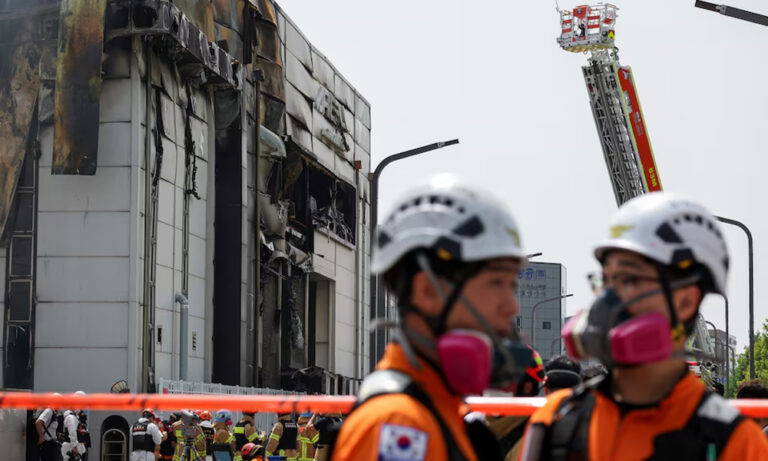A lithium battery factory in South Korea was set on fire after multiple batteries exploded on Monday, killing 22 workers, most of them Chinese nationals, fire officials said.
The fire and a series of explosions ripped through the factory run by primary battery manufacturer Aricell in Hwaseong, an industrial cluster southwest of the capital Seoul, Reuters reported.
The victims likely succumbed to extremely toxic gas within seconds of the blaze getting out of control, the officials said. It was unclear what caused the explosions and the fire was largely extinguished in about six hours.
Eighteen Chinese workers, two South Koreans and one Laotian were among the dead. The nationality of the other deceased worker was yet to be confirmed, Kim Jin-young, an official at the Hwaseong fire service, told reporters, citing information from company officials.
The blaze was first reported at 10:31 a.m. (0131 GMT) after a series of battery cells exploded inside a warehouse of 35,000 batteries, Kim said.
A Reuters journalist saw firefighters moving up to six bodies out of the factory. Due to the intensity of the blaze, rescuers were finding it difficult to identify the dead, Kim said.
Two people were being treated for major burns, officials at the scene said.
Live TV footage showed firefighters spraying the damaged steel and concrete building. Parts of the upper level had collapsed, and large chunks of the building looked like they had been blown out into the street by explosions, read the report.
Aerial footage showed massive white smoke clouds billowing from the structure and explosions rolling through the building.
Gyeonggi province fire official Cho Sun-ho said most of the foreign workers killed were temporary hires, likely unfamiliar with the structure of the building. Smoke and the fire blaze spread within 15 seconds and the victims likely succumbed after taking one or two breaths, he said.
HIGHLY FLAMMABLE
Kim Jae-ho, Fire and Disaster Prevention professor at Daejeon University, said the fire had probably spread too quickly for workers to escape.
“Battery materials such as nickel are easily flammable,” he said. “So often, there is not enough time to respond, compared to a fire caused by other materials.”
South Korea’s President Yoon Suk Yeol visited the scene of the accident later on Monday. Interior Minister Lee Sang-min called on local authorities to take steps to prevent any hazardous chemicals from contaminating the surrounding area, Reuters reported.
Established in 2020, South Korea-based Aricell makes lithium primary batteries for sensors and radio communication devices. It has 48 employees, according to its latest regulatory filing and its Linkedin profile.
Calls to Aricell offices were unanswered.
The company is not listed on South Korea’s stock market but is majority owned by S-Connect, according to Aricell’s regulatory filing. S-Connect is registered on the junior Kosdaq index and its shares closed down 22.5%.
Battery production involves the use of highly toxic materials.
“The fact that there were so many casualties when this was on only the second floor is because of the toxic materials and not so much because of burns,” said Park Chul-wan at Seojeong University.
South Korea is home to major producers of lithium-ion batteries that power electric vehicles (EVs) and to one of the world’s biggest automakers, Hyundai Motor, and its affiliate Kia (000270.KS), opens new tab, which are making a push to shift away from internal combustion cars to EVs.
Two years ago South Korea brought in legislation to punish the executives of a company in the event of a fatal accident with possible jail terms after the country saw dozens of workers killed in industrial accidents each year.













